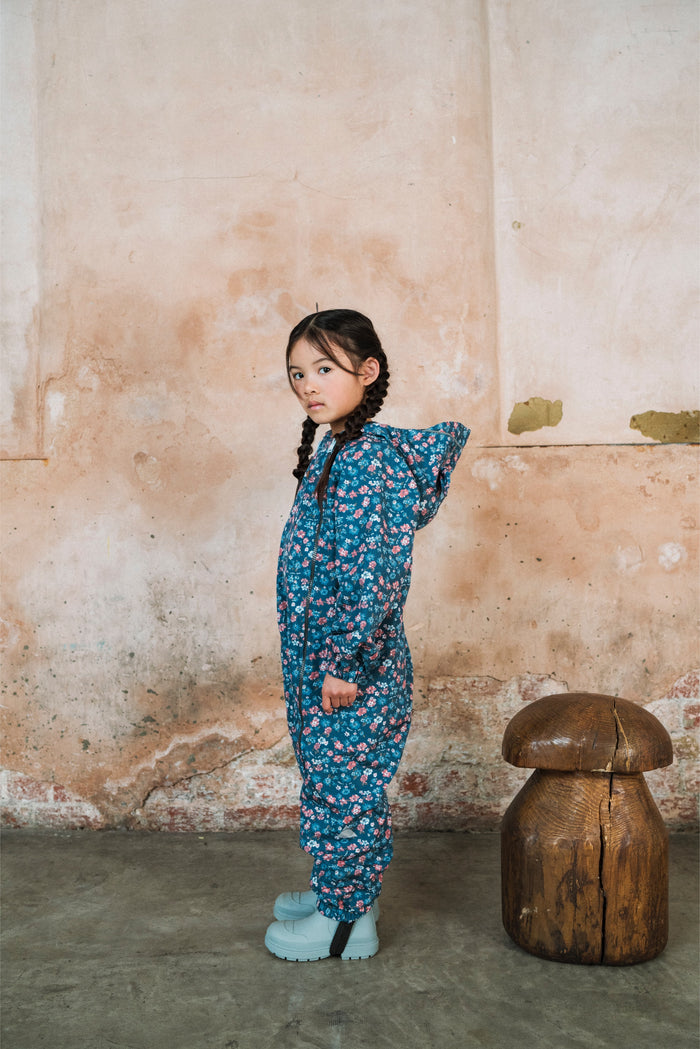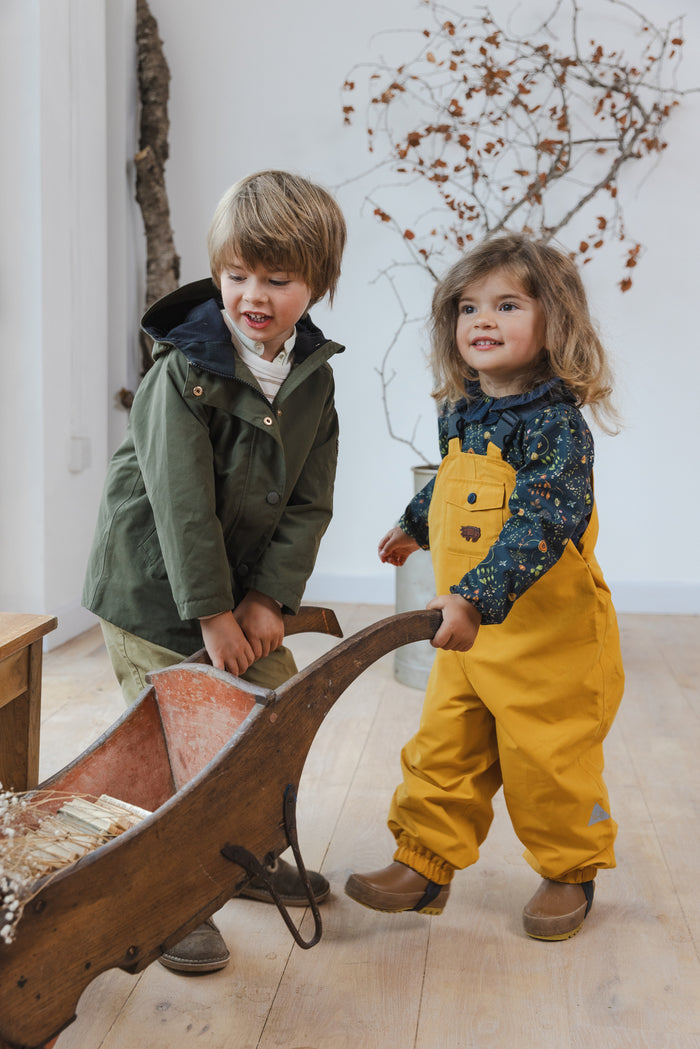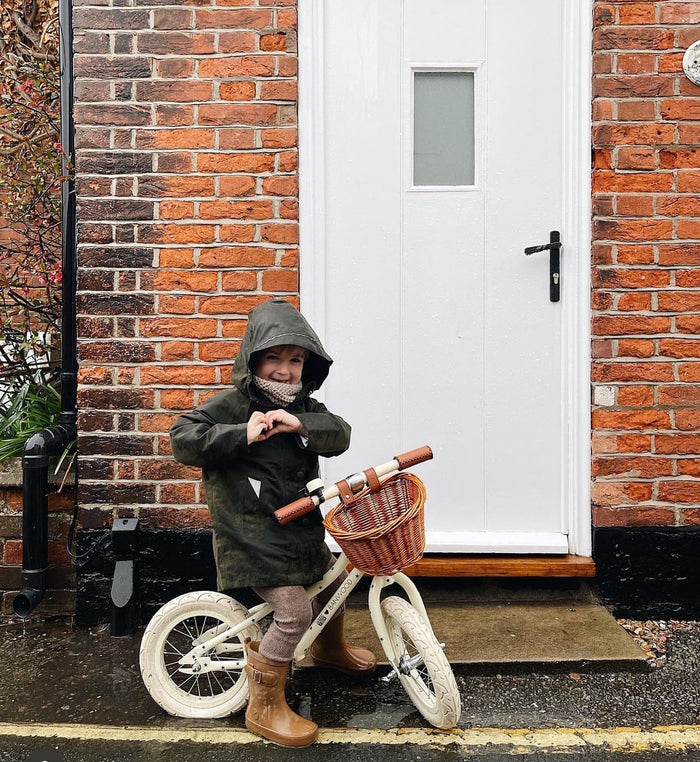


- Rekindle their imagination– Like adults, kids’ imaginations need feeding. Without toys or screens, their creativity flourishes and their imaginations run wild. On our second morning at the camp, the first we hear from the two-year-old in the cubby hole is not the standard “mummeeeeee” but a surprisingly good imitation of a collared dove, who had been cooing since dawn. By 7.30am the older one is outside with a wheelbarrow offering lifts on his ‘bus’ to Newtown. Later, by the lake, they commandeer two beached kayaks and devise an elaborate search and rescue game while Phil and I take turns to swim. Young children are at their best when lost in such self-initiated imaginary games, leaving the confines the grown-up realm to explore their own limitless world.

- Learn without effort– A great wildlife guide draws you into his or her existence so that you learn without effort and because you want to. As we meander around the woodland, adjusting to having nothing to do and nowhere to go, I show the children how to forage for wild garlic and to identify wood anemones and dock leaves – ‘Doctor Leaves”, as our youngest calls them. The farmer, Kevan, leads us on a guided walk and delivers an impromptu lesson on the layers of forests as we gaze up at the canopy of mature alders towering 25 metres above. He teaches the children to feed premature lambs milk from babies’ bottles. Early Sunday, he asks them if they’d like a ride in his gator – but, rather than make them mere passengers, Kevan, who is clearly an inveterate educator, insists the five-year-old handles the steering. Kevan makes no allowances for his age. We crash, in a perfectly controlled manner, twice – because, as Kevan says, that way he’ll learn.

- Develop new skills – With supervision, our five-year-old is now confident cooking simple things over an open fire. Having foraged for wild garlic, he cut it up, mashed it with butter, and smeared it onto bread, which he toasted on the wood stove. Every morning, he was tasked with warming milk on the stove. And in the evening, he was put in charge of the sausages sizzling in a pan. Our approach to safety has always been to develop our kids’ independence and awareness, exposing them to managed risks so they start to see dangers for themselves (it’s been termed ‘benign neglect’ but is perhaps better described as a way of providing the basic scaffolding from which they can stretch and climb). Living off-grid provides ample opportunities for your children to learn to do hazardous things in a safe way, from chopping logs to lighting fires and cooking over the flame, with the grown-ups’ undivided attention. It also throws up new and unexpected challenges. On Sunday, our eldest swims – twice, briefly! – in a lake for the first time. The cold renders him both horrified and euphoric, and he jumps immediately back into the wood-fired hot tub.

- Make new friends– Whether it’s a dog, a spider or another child, children take great pleasure in making friends on their own terms and draw new confidence from it. The benefit of being in an immersive rural environment is that it is usually safe for them to go off on their own and strike up such rewarding new friendships. On our second day, our five-year-old spots two older girls on the swings a few hundred metres away. I suggest he goes to see them. “OK”, he says and wanders off. I am not expecting such a confident response. He returns nearly an hour later, triumphant at his success. (Whether the girls would have described it thus, I can’t tell you.) The little one, meanwhile, is delighted to have made friends with a cat.

- Outdoor therapy – ‘Green therapy’ or ‘ecotherapy’ is gaining traction as a recognised treatment for mental health issues. We see it in our children every day – if they don’t spend enough time outdoors, they are far more likely to turn the sofa into a trampoline and then get into a raging row about putting the cushions back. Without time outdoors, their equilibrium goes out of whack. Humans evolved in nature – fundamentally, we are still a part of it – and countless studies bear this out, demonstrating a clear link between our mental health and time spent outdoors, particularly in woodland. Spending time in green spaces improves children’s attention and creativity and reduces stress and anxiety. In particular, a dip in nature is considered a panacea and open water swimming is currently being trialled as a treatment for depression. But a recent survey of 1,500 households in the UK found children spend more than a third of their day in front of screens, and just 6 per cent of their day outside. Taking your family off-grid resets your relationship with electronics and reminds everyone of the value of the wild.

-
Something for everyone – In 1996, American columnist Lara Adair wrote, "while children are dogs, loyal and affectionate, teenagers are cats.” Her articlehas become something of a cult, reminding those with energetic, loving little hounds to make the most of it, while stilling the concerns of those with aloof or frosty teenagers. Dogs need exercise – and children are no different, they need to play, uninhibited by scrutiny or concern. And teenagers need freedom – another thing you get in nature. Whether you are camping, glamping or simply cooking a meal outside over an open fire, going back to basics offers something for everyone.

Follow Jessica on her family adventures, fascinating musings and courageous and deeply important coverage of global events from Nairobi to the foothills of Wales @jessicajanehatcher. Thank you for bringing us with you on your journey.
Special thanks to Philip Hatcher-Moore for his awe inspiring and poignant imagery, always capturing the pure essence of the moment. It is truly a privilege to have this window into your lives.
🌿







